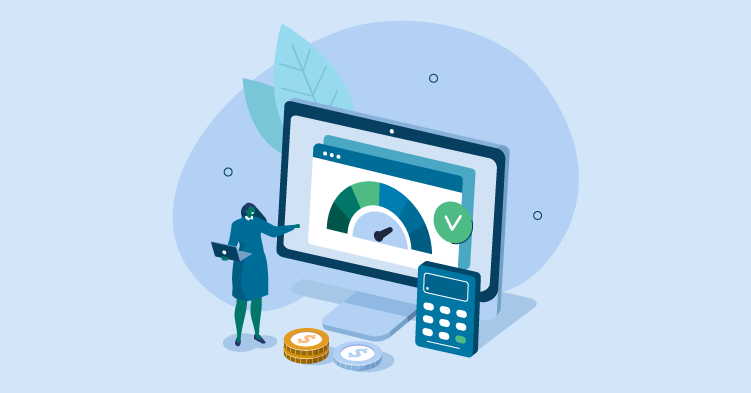Personal loans can help cover expenses — debt consolidation, home remodeling, emergencies and more — when you’re short on cash. They can also contribute to a good credit score — but only if used right.
In this blog post, we’ll look at the ways that a personal loan can potentially build credit. We’ll also look at some of their risks — if used incorrectly, a personal loan can have the opposite effect. Here are some things you need to know to build a healthy credit history when you have a personal loan.
Can a Personal Loan Help Build Credit?
Yes, when used right, personal loans can help build positive credit history and potentially improve your credit score. However, there are two things to keep in mind.
The first thing to remember is that to build positive credit history, you need to establish a consistent record of on-time payments. This means, ideally, making payments on time, every time.
The other thing to remember is that on-time payments only count toward your credit score if your lender reports to the credit bureaus. When considering borrowing options, check the lender’s website for answers about credit reporting to see if they report your payment history. If they do, on-time payments will be added to your credit file — and will contribute toward building a positive credit history. However, missed payments will also be reported, potentially damaging your score.
How Can I Build Credit with a Personal Loan?
Pay on time. Making your monthly payments on time and in full is crucial. Each on-time payment demonstrates your creditworthiness to the major credit bureaus (Experian, Equifax and TransUnion). Over time, this positive payment history will be reflected in your credit report and potentially in your credit score.
Diversify your credit mix. Lenders like to see that you can manage different types of credit. A personal loan is an installment loan, so you repay your loan in monthly installments. If your existing credit consists of revolving credit, such as credit cards or lines of credit, adding another type of loan brings diversity to your credit mix. Showing that you can responsibly manage different credit accounts can enhance your FICO score.
Borrow from a lender who reports to the credit bureaus. If payments don’t get reported, they don’t count toward credit history. If payments are missed, it could negatively impact your credit score.
What Are the Risks of Using a Personal Loan to Build Credit?
While personal loans can be beneficial for building credit, there are risks to be aware of.
Missing payments. Both missed and late payments are reported to the major credit bureaus. This can harm your credit score and result in late fees from your lender.
Overborrowing. Borrowing more than you can comfortably repay could lead to debt and financial stress. When you apply for a personal loan, only request a loan amount you can realistically repay. Be sure to account for any fees.
Hard credit checks. Submitting a personal loan application may require the lender to conduct a hard credit check, also called a hard credit inquiry. Hard inquiries appear on your credit report, and too many could lower your FICO score. If you’re applying with multiple lenders, try to do so within the span of a week or two. Many credit scoring models will recognize that you are loan shopping and may not knock your credit score. You may also want to consider lenders who conduct soft credit checks instead of hard ones. A soft credit check won’t affect your FICO score.
When Does It Make Sense to Use a Loan to Build Credit?
Generally, loans shouldn’t be used to build credit. Instead, consider using a credit card to help build positive credit history. A credit card can be used sparingly and easily paid off in full with no interest. You can keep a credit card account open for a long time, even if you don’t use it much, which can lengthen your credit history. Credit cards also increase your available credit, which can boost your credit utilization ratio.
However, in some cases, a loan may make sense.
If you have no credit, limited credit or bad credit, personal loans offer an opportunity to establish creditworthiness. Just be sure you make each monthly payment on time.
If you need to consolidate high interest debt, using a personal loan to pay off high-interest credit card debt can improve your credit utilization ratio and overall credit score. For those looking to pay off a credit card balance or another type of high-interest debt, funds from a personal loan could help cover those balances. Your debt would then be “transferred” to one loan, ideally at a lower interest rate than your previous debt. In this scenario, a personal loan could help with debt consolidation.
Where Can I Find Personal Loans That Will Help Me Build My Score?
For a personal loan to help build credit, the lender must report payments to the credit bureaus. Online lenders as well as traditional financial institutions — such as banks and credit unions — do this. Remember: with credit reporting, it’s important to consistently make on-time payments. If you miss a payment, it can have the opposite effect. Be sure to compare interest rates, loan terms and fees to find the best personal loan options for you.
If you’re interested in taking out a personal loan specifically to build credit, look into credit-builder loans. Offered by some lenders, these loans are designed for those with no credit or poor credit. A credit-builder loan involves borrowing a small amount of money from a lender, which is secured in a savings account or CD (Certificate of Deposit). Regular payments are made over several months, which helps build a positive credit history. After repaying the loan, the borrower gets access to the saved money and interest.
What Are Some Alternatives to Personal Loans?
If a personal loan isn’t the right choice for your financial goals, consider these alternatives.
Home equity loans or home equity lines of credit (HELOC). If you own your home, you may be eligible for home equity financing. Interest rates are typically lower with this loan type, because the home is used as collateral.
Credit cards. If you pay your credit card balance in full and on time, you usually won’t be charged interest. Keeping an open credit card account also contributes to your length of credit history. Plus, they usually offer features and rewards. Credit cards can either be secured or unsecured. Secured credit cards require a security deposit, but they are especially helpful for those trying to build their credit.
Personal lines of credit. A personal line of credit is a predetermined amount of money that a financial institution agrees to lend you. In a way, it’s similar to a credit card. You can access funds as needed, up to the credit limit, and only pay interest on the amount you use. Repayment terms can vary, however. Personal lines of credit may have slightly lower interest rates compared to credit cards, but the approval process may be more involved.
DISCLAIMER: This content is for educational and informational purposes only, and is not intended as financial, investment, or legal advice. NetCredit is not affiliated with, endorsed by, or sponsored by the individuals or other entities mentioned in any way.






